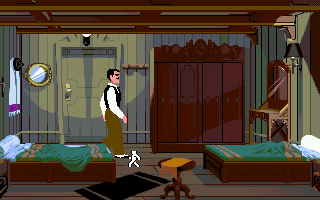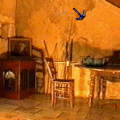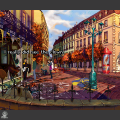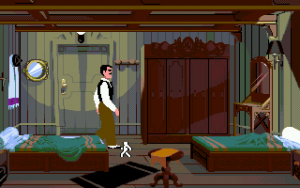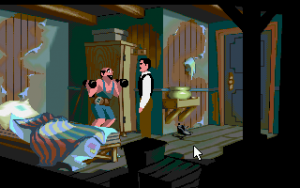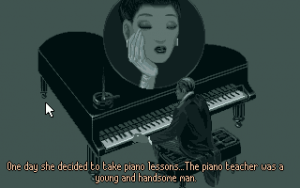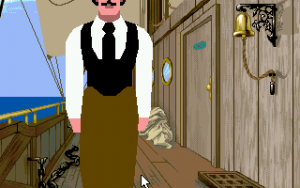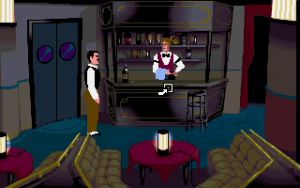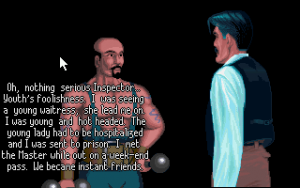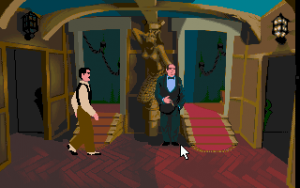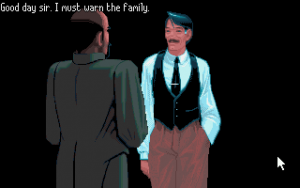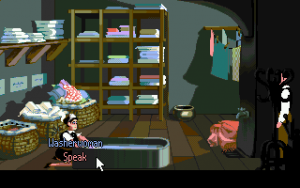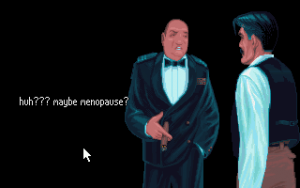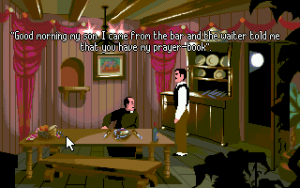Delphine’s third and final adventure game is a murder mystery, one heavily inspired by the works of Agatha Christie. The wealthy businessman Niklos Karaboudjan is hosting a party on his luxurious cruise liner. He is brutally murdered, but luckily enough for him, he happened to invite French inspector Raoul Dusentier, who takes it upon himself to investigate the killing.
Cruise for a Corpse is so very desperately patterned after Sierra’s The Colonel’s Bequest. Not only does it draw from the same sources, but it borrows the exact same structure. You’ve got free run of the boat, but the game is divided into “time blocks”, causing the clock to pass whenever certain actions are taken. At each time block, characters change locations, and are potentially willing to talk about new subjects.
But The Colonel’s Bequest was designed to be a relatively easy game for non-adventure gamers – you could aimlessly wander around and accidentally move the plot forward without having any idea what you were doing, and at the same time not really worry about solving any puzzles. Cruise for a Corpse feels like an antidote to that, as it’s clearly meant for gamers who actually like to investigate. It’s much more deliberate, requiring that you talk to a specific person about a specific subject, or find one particular piece of evidence, before the game moves forward. In some ways, it works pretty well, because you never need to worry about missing any part of the story. But it’s also poorly implemented, as there’s absolutely no rhyme or reason behind the triggers beyond the game’s internal logic, nor any real guidance. Every time you move the clock forward, you know you’ve done something right, but where to take the next step is never clear. The only recourse is to investigate every room and talk to every person again and again, or re-examine rooms for clues. Necessary items will magically appear between time blocks without any reason or suggestion that they were put there. It’s all quite maddening.
Just the very act of investigation induces headaches. As a trained member of the police force, Raoul Dusentier is an absolutely terrible inspector. He categorically refuses to search when he thinks it isn’t relevant, to the point where his arrogance grows tiresome. You don’t think that drawer is useful, Inspector, but at least give the player the courtesy of looking in it instead of shooting down every single suggestion the player gives you. Of course, this being developed by Delphine, whose Future Wars practically redefined the frustration of pixel hunting, most of the important items are tiny and blend in with the scenery. Furthermore, as you progress through the mystery, you eventually gain a long list of conversation topics. It never highlights the one’s you’ve already discussed though, making it difficult to pick out new lines of inquiry without just barreling through the whole list until you find the topic that’ll progress the time.
It’s just as well, because there aren’t too many items to find, nor very many puzzles to solve. Instead, most of the investigation is simply spent interrogating the rest of the boat’s guests. There’s nothing actually wrong with this in concept, but in execution it falls completely on its face because the writing just isn’t very good. There are nearly a dozen characters, each with their own backgrounds, quirks and motivations, but outside of the strange butler who looks like a circus muscleman, none of them have any real personality. Perhaps this was the result of a poor translation, evidence of which can even be seen in title. Maybe the original French title, Croisiere pour un cadaver, sounds alright, but Cruise for a Corpse sounds patently ridiculous in English, and conjures a sense of cheesiness which isn’t actually found within the game itself. It is, however, absolutely filled with lines of dialogue which just don’t sound right.
One character, when questioned about his background, casually implies that he may have raped someone. (“Oh, nothing serious Inspector. Youth’s foolishness. I was seeing a young waitress, she lead me on. I was young and hot headed. The long lady had to be hospitalized and I was sent to prison.”) Another makes a reference to Donald Trump, apparently forgetting that the story is set in 1927 and the noted billionaire wouldn’t be born for another twenty years. When the improbably named Dick Shmock is inquired about the illness of another female guest, he simply responds “huh??? Maybe menopause?” (The grammatical issues have been preserved to stress its sloppiness.) Technically, the translation isn’t any worse than Delphine’s other games, but those weren’t nearly so reliant on text either.
Which is a shame, because there’s actually a pretty decent story behind the poor writing. It’s got all of the ingredients of a classic thriller, complete with numerous intertwining dramas – arranged marriages, illegitimate children, substance addictions, illicit affairs, inheritance disputes, secret identities. It’s nothing innovative, but it’s classically done, and the climax is certainly much more compelling than The Colonel’s Bequest.
Digging through the mess to get to that story isn’t really worth it, though. Beyond that, Cruise for a Corpse is really only known for its rotoscoped character graphics, the kind which would Delphine would reuse for Out of This Worldand Flashback. The sprites are large and the animation is extremely smooth, sometimes distractingly so. There are only a couple of scenes where the backgrounds are set to take advantage of it, though. Certain backgrounds are positioned so Dusentier walks directly towards or away from the camera, which looks impressive, except when his crotch ends up walking right in the center of the monitor. The close-ups during dialogue are done with standard bitmaps, since they are much more detailed and are barely animated. The only time it really takes advantage of the technology is with the ending, which, cinematically, is very similar to the intro of Out of This World. (Without the particle accelerator and alien world, obviously.) Like the rest of Delphine’s output, it’s cool to see the influence upon their later, better titles, but as a standalone product there isn’t a whole lot worthwhile about Cruise for a Corpse.
